Polish Genealogy: 4 Steps to Find Your Family History
Researching your Polish genealogy may seem a little intimidating at the start. Read these get-started tips from a Polish genealogy veteran at Legacy Tree Genealogists. Then you’ll know how to dive right into your Polish family history–and where to turn if you need a little help.
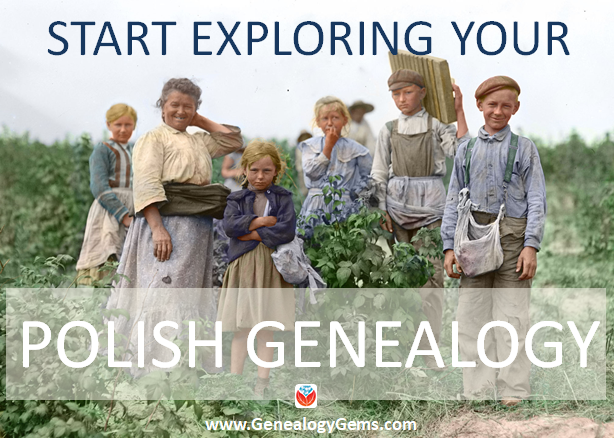
Thanks to Legacy Tree Genealogists for supplying this guest blog post. Legacy Tree employs researchers with a wide range of expertise. They asked their Polish expert, Julie, to share tips for finding Polish ancestors, based on her decades of experience.
If you’re an American researching your Polish ancestors, you aren’t alone. Polish Americans make up the largest Slavic ethnic group in the United States, second largest Central and Eastern European group, and the eighth largest immigrant group overall. So how do you begin tracing your roots in Poland?
Get Started: 4 Polish Genealogy Tips
1. Get to know the basics of Polish history.
Probably every Polish-American family has heard mention of the “border changes” that were supposedly the reason why Grandpa’s papers say he was from Austria, although everyone knew he was Polish. What many people don’t realize is that Poland did not exist as an independent nation from 1795 until 1918. Historically, Polish lands were partitioned among the Russian, Prussian, and Austrian Empires, and ethnic Poles were citizens of one of those three nations. This is why you might see your Polish ancestors stating Russian birth on the 1910 U.S. census, but Polish birth on the 1920 U.S. census, after Poland was reestablished as an independent nation.
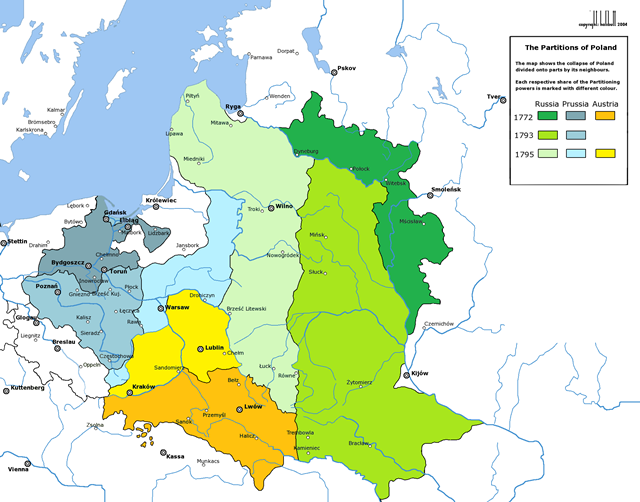
By Rzeczpospolita_Rozbiory_3.png: Halibuttderivative work: Sneecs (talk) – Rzeczpospolita_Rozbiory_3.png, CC BY-SA 3.0, click to view on Wikipedia.
2. Determine your Polish ancestor’s religion.
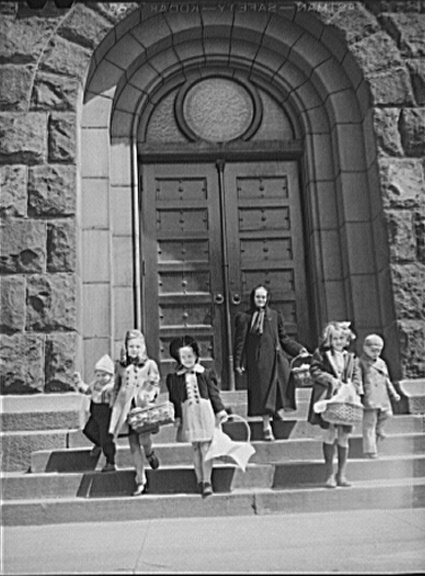
Buffalo, New York. Children of the Polish community leaving church with baskets of food on the day before Easter. Library of Congress photo; digital image via Wikipedia. Click to view.
Although we in the U.S. are accustomed to the separation of church and state, this was not the case in many places. In Poland, it was common for priests, ministers, or rabbis to act as civil registrars, blending ecclesiastical and government authority as they recorded births, marriages, and burials. Although this was the protocol in all three partitions for the majority of the 19th century, the exact span of dates in which this was true vary based on the partition in which your ancestors lived, and greatly affects where you should be searching for the records you need. In “Russian Poland,” for example, civil record keeping began in 1808 with Roman Catholic priests acting as civil registrars for people of all faiths (not just Catholics). Beginning in 1826, each faith was allowed to keep its own civil records using a paragraph-style format that remained relatively stable through the 1930s. Civil registration that was independent of any religious organization did not begin until 1945.
The fact that civil copies of church records were made increases the likelihood that records survived for your ancestor’s town. There’s a persistent myth that “all the records were destroyed in the wars,” but that’s simply not true in most instances. Existing records for some locations date back to the 1600s, but in other places surviving records are sparser.
3. Use U.S. records to determine your ancestor’s precise place of origin.
Grandma may have said that her father came from Warsaw, but most of our ancestors came from small villages, not large cities. It’s more likely that her father was using Warsaw as a point of geographic reference to give people a rough idea of where he lived, since others are unlikely to recognize the name of a small village. This means that you most likely won’t find his birth record by looking for it in Warsaw, but it also leaves you in the dark about where to look instead.
 What kinds of records are most likely to indicate a precise place of birth? Passenger manifests and petitions for naturalization (if dated after 1906) are great sources for this information. If your Polish ancestors were Catholic, church records from the parish they attended in the U.S. are much more likely to contain specific place of birth than their civil equivalents. These include marriage records for immigrants who married in the U.S., baptismal records for U.S.-born children of immigrants, and church death/burial records.
What kinds of records are most likely to indicate a precise place of birth? Passenger manifests and petitions for naturalization (if dated after 1906) are great sources for this information. If your Polish ancestors were Catholic, church records from the parish they attended in the U.S. are much more likely to contain specific place of birth than their civil equivalents. These include marriage records for immigrants who married in the U.S., baptismal records for U.S.-born children of immigrants, and church death/burial records.
Click here for an article about a woman who found her Polish Catholic grandparents’ church marriage record–and with it their overseas birth place–at St. Stanislaus parish in Buffalo, NY. You’ll also learn tips for finding Catholic church records in the U.S.
If your ancestors were Jewish, check cemetery records for mention of any landsmannschaft to which they might have belonged. Landsmannschaften were fraternal aid societies organized by immigrants from the same town in Europe, and they frequently purchased large burial plots for their members.
4. Use a gazetteer to determine the parish or registry office that served your ancestor’s village.
Depending on which partition your ancestors came from, some good gazetteers include:
- The Słownik geograficzny Królestwa Polskiego i innych krajów słowiańskich, or Geographical Dictionary of the Kingdom of Poland and Other Slavic Countries, published between 1880 and 1902 in 15 volumes. The SGKP is written in Polish.
- The Skorowidz Królestwa Polskiego, which includes all of Russian Poland (officially known as the “Królestwo Polskie” or Kingdom of Poland) published in 1877. The SKP is mostly written in Polish with some text in Russian.
- Kartenmeister, an easy-to-use online gazetteer for “German Poland” that covers East Prussia, West Prussia, Brandenburg, Posen, Pomerania, and Silesia. Kartenmeister can be searched using either the German or the Polish name for a town.
- The Galician Town Locator, offered by Gesher Galicia, is another easy-to-use resource that covers the historic Galicia region, which was a part of the Austrian Empire that is now split between Poland and Ukraine.
- The JewishGen Gazetteer is a phonetic gazetteer to assist in identifying the correct location in cases where your ancestor’s place of origin is misspelled on U.S. records. It covers areas throughout Central and Eastern Europe.
Once you have correctly identified both your ancestor’s place of birth and the location of his place of worship or civil records office, you’re ready to make the jump back to records in Poland.
Get Expert Help with Your Polish Genealogy Questions
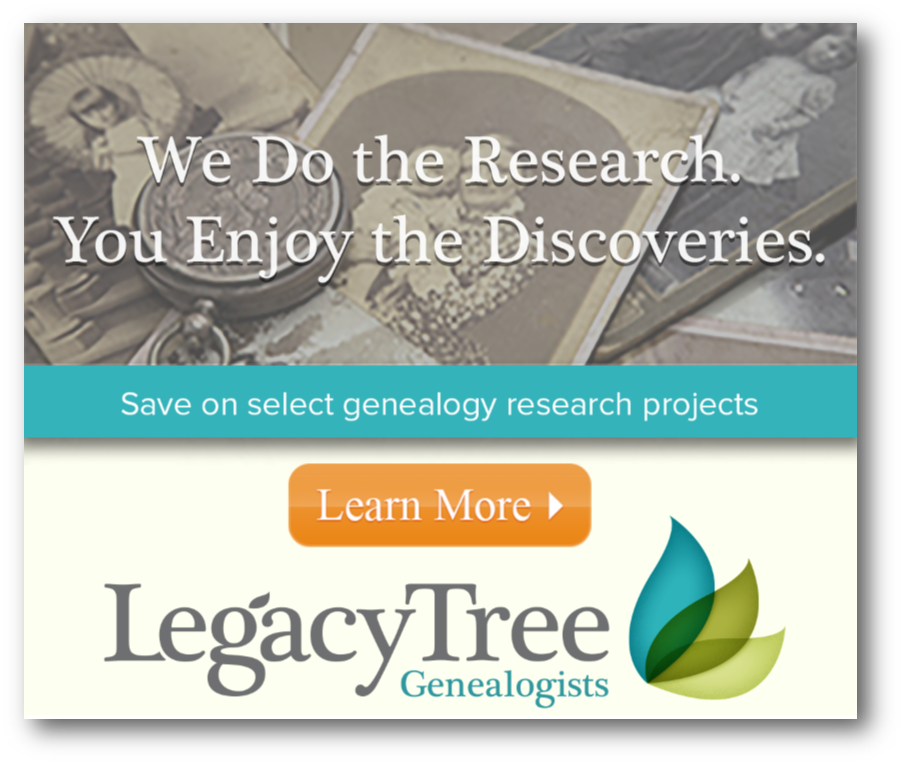 We at Legacy Tree Genealogists would be honored to assist you with any step along the way in your journey to discover your ancestral origins, including onsite research if needed. Our experts have the linguistic and research skills to efficiently find your family. Contact us today for a free consultation.
We at Legacy Tree Genealogists would be honored to assist you with any step along the way in your journey to discover your ancestral origins, including onsite research if needed. Our experts have the linguistic and research skills to efficiently find your family. Contact us today for a free consultation.
Exclusive offer for Genealogy Gems readers: Save $100 on a 20-hour research project using code GG100, valid through October 31st, 2017.
We Dig These Gems! New Genealogy Records Online

Here’s this week’s roundup of new genealogy records online: California, England, Australia, and Italy.
UNITED STATES – CALIFORNIA. Ancestry.com has added a new index titled California, Chinese Arrival Case Files Index, 1884-1940. This index includes passenger and crew lists of ships and airplanes arriving in California. Information you may find in these records are: name of passenger, ship name, port of arrival and in some cases, age, gender, birth date, birth place, and port of departure.
UNITED STATES – MILITARY. United States WWII Prisoner of War records for 1942-1947 have just been added to TheGenealogist.com in time for the anniversary of D-Day. These records inlcude U.S. military and Allies who were prisoners of war and internees. Some prisoners of both Germany and Japan are found in this collection. Records include the prisoners name, status, rank, service number, POW camp, and more valuable data.
ENGLAND – DEVON – PRISON RECORDS. Plymouth Prison Records for 1832-1919 at Findmypast include male and female prisoner records and prison officer records for Plymouth Prison in Devon. Recorded information includes name, birth date, offense, sentencing, last residence, residence of relative, physical description, and much more valuable data.
AUSTRALIA – QUEENSLAND – DEATH RECORDS. Findmypast subscribers can now conveniently search Queensland, Australia Death Records for 1829-1964 on Findmypast. These indexed records include: name, registration year, death date, father’s first and last name, mother’s first name, and sometimes her maiden name. (Birth, marriage and death indexes for Queensland are online for free at the State Library of Queensland website. Their death index goes from 1829-1986.)
ITALY – ROMA – CIVIL REGISTRATION. The Italian Civil Registration between the years of 1863-1930 has been newly added to FamilySearch.org. It is not yet indexed, but able to be browsed. Don’t be intimidated by its more than 4 million digitized images! They have broken down the database to be easily browsed by location and year. Marriage banns and residency records are just a two of things covered in this database.
 Don’t miss our newest free Genealogy Gems Podcast #192 for more tips and strategies to help you in your genealogy journey. Pop on over and listen now – we’d love to have you!
Don’t miss our newest free Genealogy Gems Podcast #192 for more tips and strategies to help you in your genealogy journey. Pop on over and listen now – we’d love to have you!
How to Download Backblaze in 4 Easy Steps
 Don’t be intimidated by signing up for Backblaze, the cloud-based computer backup service I recommend.
Don’t be intimidated by signing up for Backblaze, the cloud-based computer backup service I recommend.
Here’s how to download Backblaze in four easy steps. Protecting genealogy data, family photos, and other files is essential!
I was pretty startled when I discovered that the cloud backup service I used to use wasn’t backing up my video files! That was a deal-breaker for me. So, after reviewing other cloud backup service options, I chose Backblaze. I’m really glad I did. Backblaze runs 24/7 through my internet connection and is constantly saving changes I make to every file. That means if my computer is lost, stolen, destroyed, or hit with deadly viruses, I’ll always have copies of my files and that even includes my large video files!
Genealogy Gems Premium website member Kathy felt a little intimidated about downloading BackBlaze for the first time:
“I received your e-mail yesterday with all the helpful information. I remember you mentioning Backblaze in previous e-mails, and I looked up their website and read the information I could find. However, it did not show the download steps, so I could not tell how difficult it would be and if it would ask me really hard questions that I would not know how to answer during backup, so I didn’t subscribe.
I have had a few external hard drives with backup programs before and they were very difficult and I didn’t want to go through that again. But, I decided that today would be the day, that I would back up my computer…I subscribed to Backblaze. I trust your judgement, so thank you for your advice.”
Have you wondered, like Kathy did, if it would be complicated to set up Backblaze? Has it held you back from taking the leap to protect your files? I want you and our other readers and listeners to feel 100% confident in downloading this awesome back-up service. Here’s how to download Backblaze to your device in four easy steps.
- Click here to go to Backblaze and begin your free 15-day trial by clicking on “Try Free Trial.”
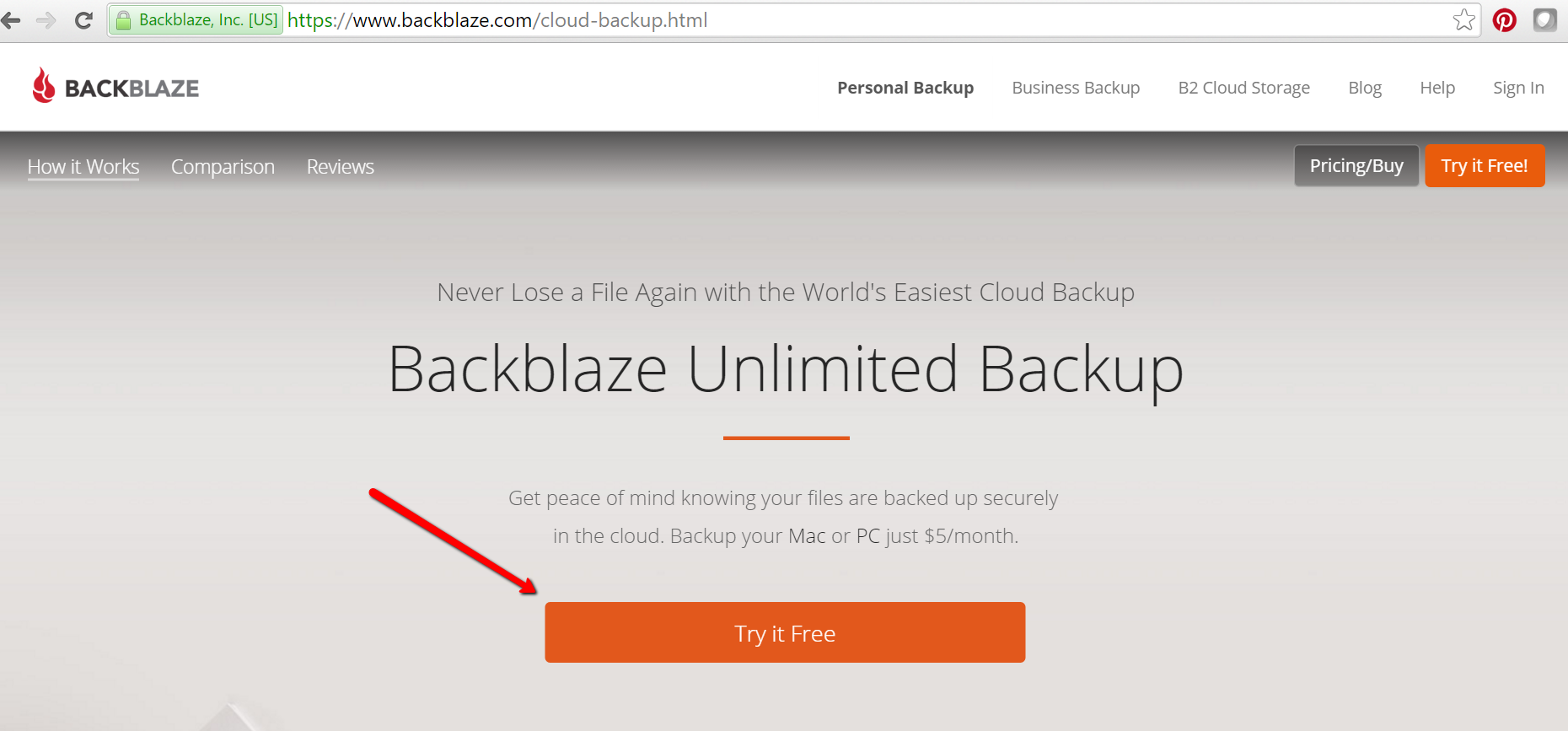
- You will be asked to create an account using your email address and choosing a password. Once you have clicked “Start Backing Up,” a pop up window will appear and you can download Backblaze to your device.

- Next, another pop-up window will ask your permission to install Backblaze to your device. Click “Ok.”
- Wait patiently. Yet another pop-up window will appear and ask you to “Install.” Click “Install Now.” It may take several minutes depending on the speed of your internet connection.
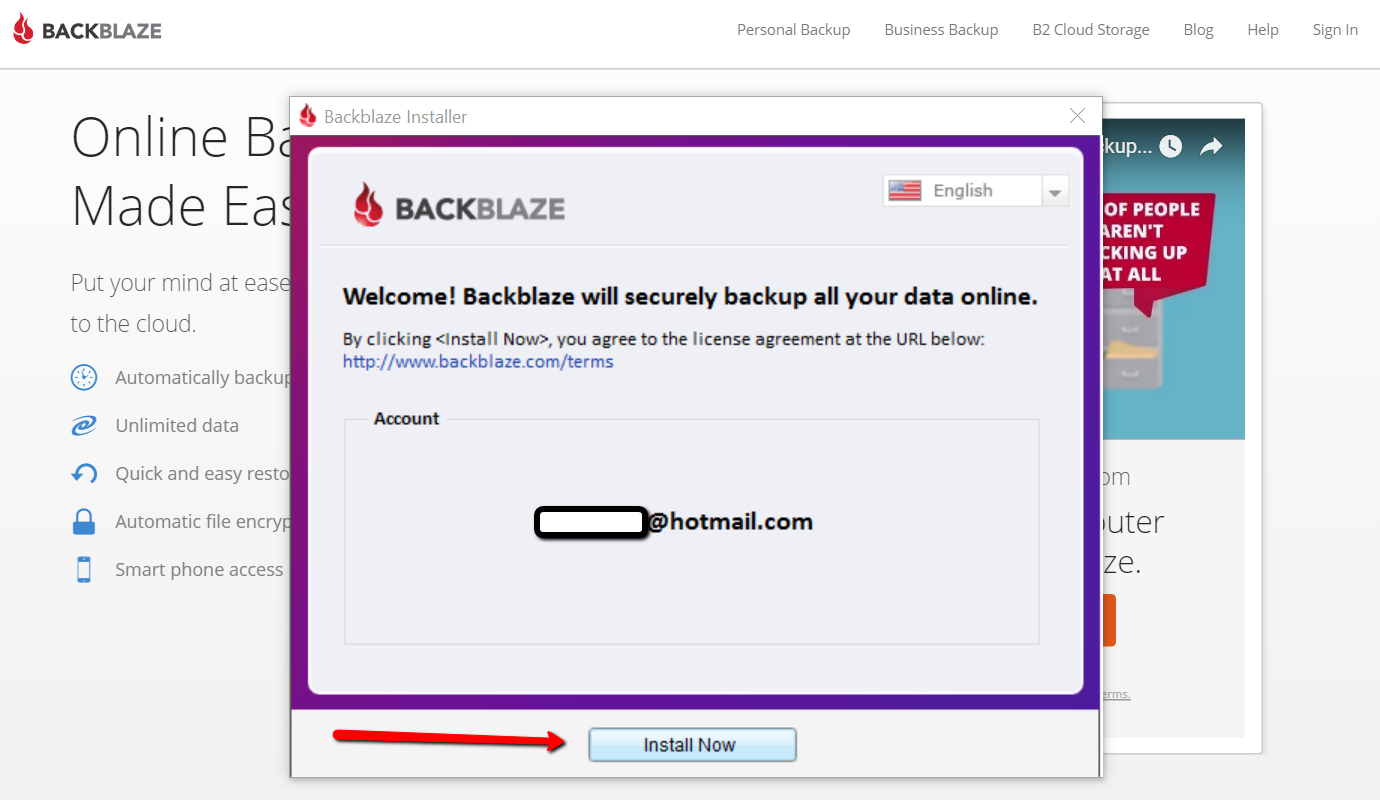
You have now installed Backblaze and the back-up process has begun. You can continue to use your device normally as all your data is backing up.
How to Schedule Your Back-up Time
It is quick and easy to set up a time for Backblaze to back-up your data. By clicking on “Settings,” and then “Schedule,” you have the pull-down menu options of a continuous backup (this is the option Backblaze recommends, and the one I chose,) a daily backup, or “when I click <back up now>.” Choose whatever option is best for you and then click “Apply” and “Ok” at the bottom of the window. You are all set!
A Crucial Aspect of Your Genealogy Research
So, why did Kathy want cloud backup service? She says:
In 2013, we had a house fire and we lost everything but the clothes on our backs. I lost 30 years of genealogy, all my records and my genealogy library, plus all the ancestral photos that can never be replaced. I did have a back-up system, but it burnt right along with my computer. At first, I thought I would never do genealogy again. I would never be able to replace all that I had lost. It was costly enough to order all the birth, death, and marriage records the first time. There was no way I could do it again. I bought another computer and a copy of Family Tree Maker 2012 and decided that I would just work on some of the families that I was most interested in. I have very limited resources now, but I am enjoying trying to rebuild little bits of my tree. Thank you for all you do for the genealogy community. It is greatly appreciated.
My heart aches for Kathy’s loss. I hear stories like her’s far too often. I truly believe that backing up our precious genealogy data is a crucial (and underutilized) aspect of family history research. I hope her story will help to encourage others to start backing up today. I am so happy that many Gems, like Kathy, are now using Backblaze.
After doing my homework, I was proud to bring Backblaze on as the official backup of The Genealogy Gems Podcast. Please get the word out there to your favorite genies that Backblaze is an effective and cost-efficient way to save us from loss of our most important data. They’ll be thanking you!
